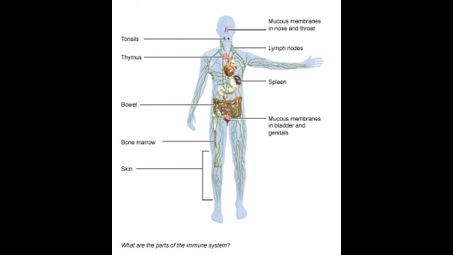What are the organs of the immune system?
Our immune system is made up of both individual cells and entire organs and organ systems which fight against foreign infection from harming our bodies
Starting from Organs that function as barriers Your skin and mucous membranes are the first line of defense against germs entering from outside the body. ** Lymphoid organs** The lymphatic system is composed of: ** Primary lymphoid organs**: These organs include the bone marrow and the thymus. They create special immune system cells called lymphocytes.
Bone marrow Bone marrow is a sponge-like tissue found inside the bones. That is where most immune system cells are produced and then also multiply. These cells move to other organs and tissues through the blood. At birth, many bones contain red bone marrow, which actively creates immune system cells. Over the course of our life, more and more red bone marrow turns into fatty tissue. In adulthood, only a few of our bones still contain red bone marrow, reason why you need to strengthen your immune system with healthy food and supplements like these (linktr.ee/HealthyAid ) to help strengthen the immune system.
Thymus This gland-like organ reaches full maturity only in children, and is then slowly transformed to fatty tissue. Special types of immune system cells called thymus cell lymphocytes (T cells) mature in the thymus. Among other tasks, these cells coordinate the processes of the innate and adaptive immune systems. T cells move through the body and constantly monitor the surfaces of all cells for changes.
** If you want to build a strong immune system check these out // linktr.ee/HealthyAid (remove the spaces)**
Secondary lymphoid organs: These organs include the lymph nodes, the spleen, the tonsils and certain tissue in various mucous membrane layers in the body
Lymph nodes Lymph nodes are small bean-shaped tissues found along the lymphatic vessels. The lymph nodes act as filters. Various immune system cells trap germs in the lymph nodes and activate the creation of special antibodies in the blood.
Spleen It stores various immune system cells. When needed, they move through the blood to other organs. It breaks down red blood cells (erythrocytes). It stores and breaks down platelets (thrombocytes), which are responsible for the clotting of blood, among other things. ** Tonsils** The tonsils are also part of the immune system. Because of their location at the throat and palate, they can stop germs entering the body through the mouth or the nose. The tonsils also contain a lot of white blood cells, which are responsible for killing germs.
Mucous membranes
The bowel plays a central role in defending the body against germs: More than half of all the body's cells that produce antibodies are found in the bowel wall, especially in the last part of the small bowel and in the appendix. These cells detect foreign substances, and then mark and destroy them. They also save information about the substances in order to be able to react more quickly the next time. The large bowel also contains harmless bacteria called gastrointestinal or gut flora. Healthy gut flora make it difficult for germs to spread and enter the body.
Mucous membranes support the immune system in the body, The immune system cells are directly beneath the mucous membranes, where they prevent bacteria and viruses from attaching

What else can I help you with?
What organs make up the immune system?
what organs make up the immune system
What organs the immune system?
* * * * * * * * *
10 organs of the immune system?
There are not up to ten organs in the immune system. Here are the ones I am certain do appear in the chain though:StomachPancreasLiverSmall intestineLarge intestineRectumAnusThe mouth and oesophagus are also part of the immune system but they are not organs
What organ make up the immune system?
what organs make up the immune system
What is the immune system composed of besides organs?
Our immune system is made up of both individual cells and proteins as well as entire organs and organ systems.
What are the eight organs of the immune system generally referred to as?
the refereed as the immunity organs
Organs that make up the immune system?
the testies
What organs allow the immune system to function?
spleen
What are the 2 organs of the immune system?
sleen and thymus
What are the eight organs of the immune system?
The eight organs of the immune system are the tonsils, thymus, bone marrow, spleen, lymph nodes, adenoids, appendix, and Peyer's patches in the small intestine. These organs play crucial roles in the immune response, such as producing and storing immune cells, filtering pathogens from the bloodstream, and coordinating immune responses.
What is the system of organs tissues cells and antibodies that fight germs?
The immune system.
What are the accessory organs of the immune system?
appendix, tonsils, intestines
